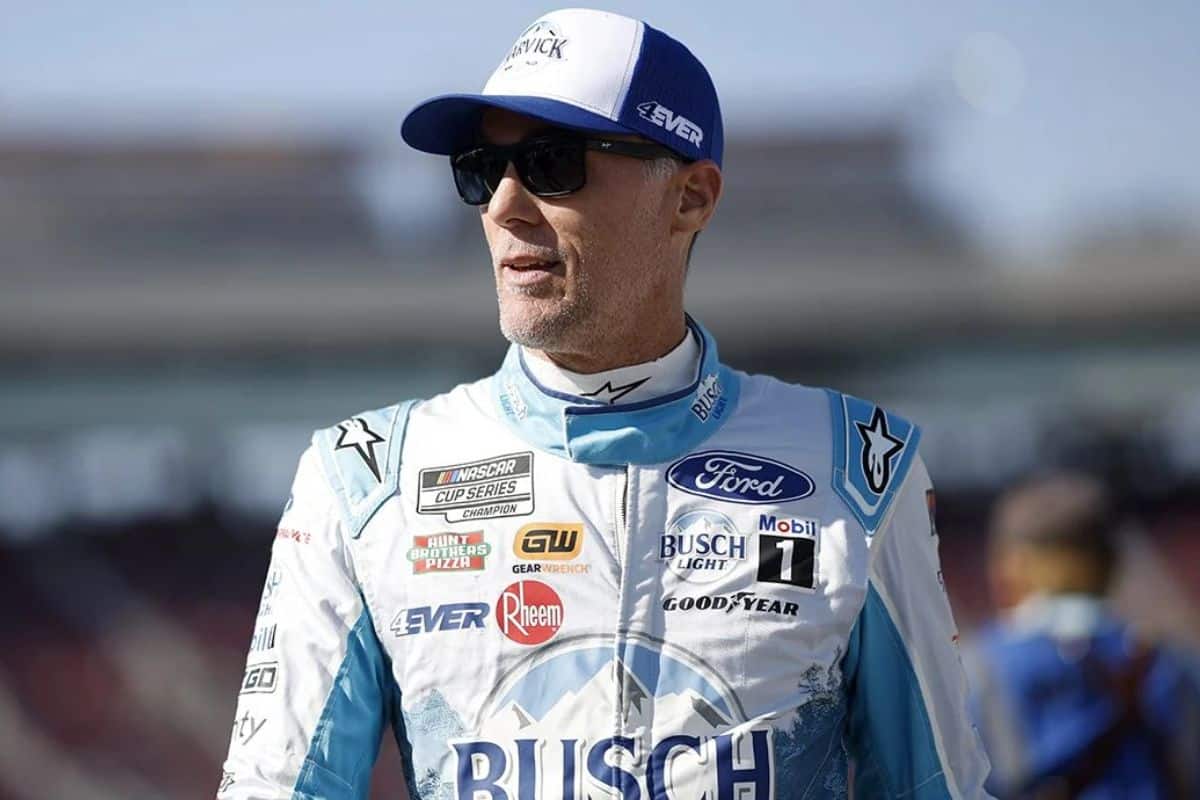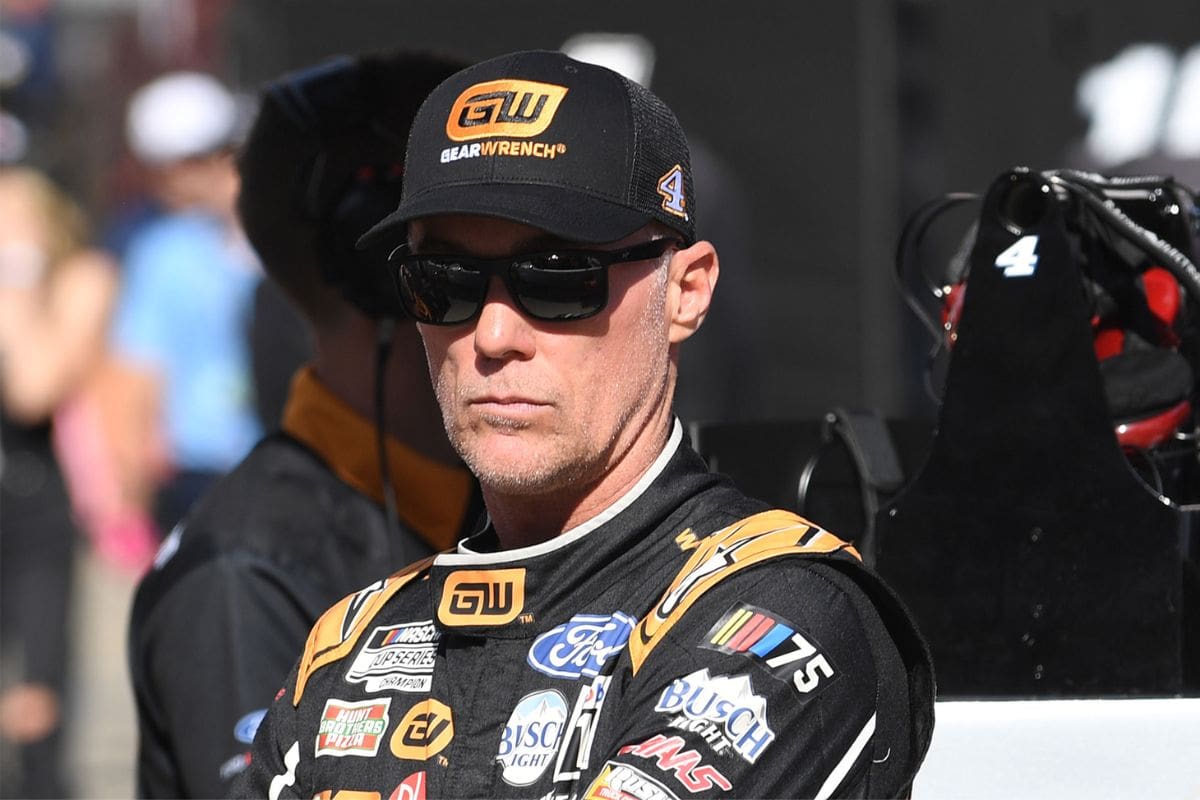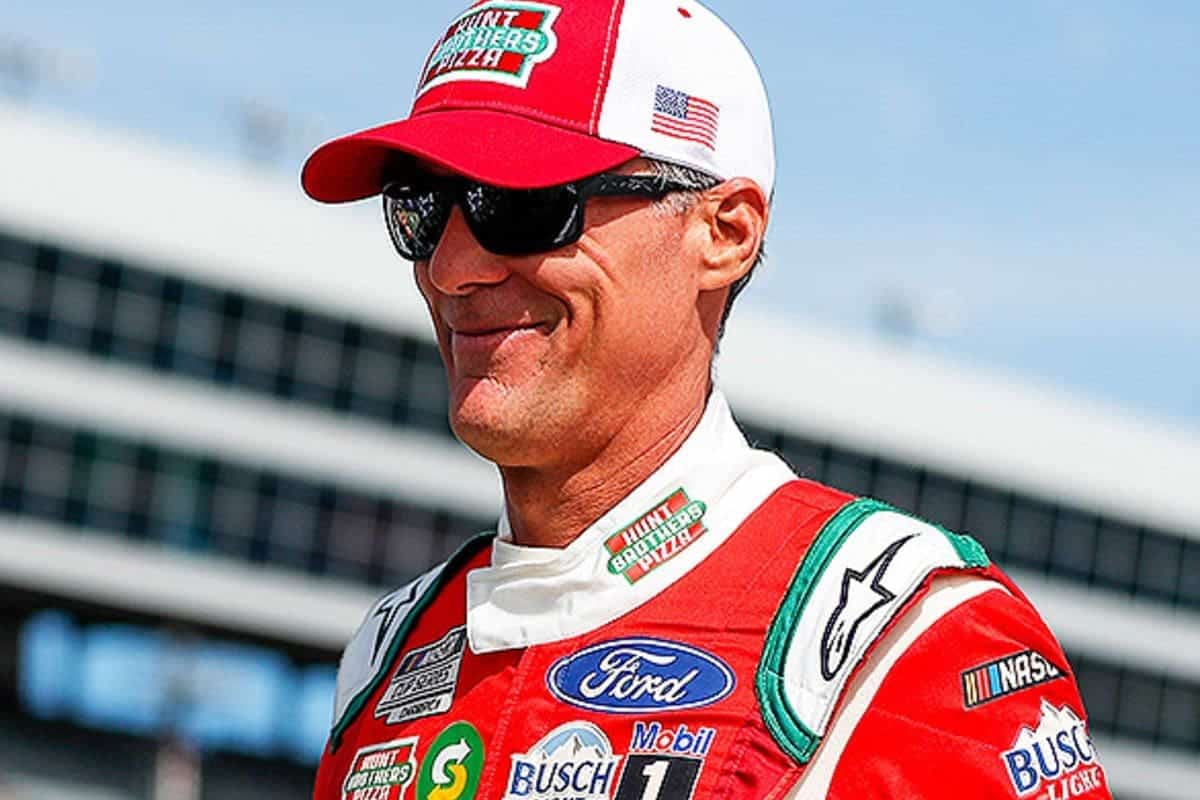Kevin Harvick Questions Larson’s Waiver: Kevin Harvick‘s recent critique of NASCAR’s waiver system, specifically questioning Kyle Larson‘s waiver for the Indy 500, highlights a critical discussion about the integrity and fairness of these decisions. By comparing this with Kyle Busch’s waiver in 2015, Harvick emphasizes the need for a more transparent and consistent approach within NASCAR. His call for stronger leadership and a return to traditional values brings attention to potential cracks in the current system. How will NASCAR respond to such pointed criticism from one of its veteran drivers, and what implications could this have for the future governance of the sport?
Key Highlights
- Harvick supports Kyle Larson’s waiver for the Indy 500 but criticizes the overall inconsistencies in NASCAR’s waiver system.
- He recalls Kyle Busch’s 2015 waiver and its impact on competitive fairness and NASCAR’s integrity.
- Harvick emphasizes the need for structured decision-making and consistent waiver policies in NASCAR.
- He advocates for stronger leadership and a return to old-school toughness within the sport.
- Harvick calls for transparency and fairness in the application of NASCAR’s waiver system.
Driver Opinions on Kyle Larson’s Waiver
The debate over Kyle Larson’s waiver has elicited a spectrum of reactions from his fellow drivers, highlighting the complexity and divisiveness of the issue. Among the voices in the paddock, there is a noticeable diversity of opinions regarding the fairness and implications of granting Larson the waiver.
Drivers like Joey Logano have adopted a more neutral stance, articulating the difficulty in arriving at a definitive verdict. Logano encapsulated this sentiment succinctly, stating, ‘It opens a can of worms. There’s just no clear-cut answer to this one.’ His comment emphasizes the inherent ambiguity and subjectivity involved in such decisions.
Conversely, drivers like Denny Hamlin and Kevin Harvick have expressed more explicit opinions. Hamlin, known for his openness, has not shied away from making his position clear. The straightforwardness of his viewpoint suggests a desire for consistency and transparency within the waiver system. Kevin Harvick, another experienced driver, has also been vocal, potentially reflecting broader concerns about the integrity and fairness of the competitive landscape.
The situation with Larson, who drives the #5 car, serves as a part of the larger debates surrounding NASCAR’s waiver policies. The varying perspectives of the drivers indicate a need for a more structured and perhaps codified approach to such decisions. While support for Larson is evident among many of his peers, the calls for clarity and consistency are equally prevalent.

Kevin Harvick’s Support for Larson and Disdain for Waiver System
Kevin Harvick’s recent comments on his podcast, ‘Kevin Harvick’s Happy Hour,’ reveal a detailed stance that simultaneously supports Kyle Larson’s waiver for the Indy 500 while vehemently criticizing NASCAR’s all-encompassing waiver system. Harvick unequivocally expressed his admiration for Larson’s ambition and versatility
“I love all of our competitors to death, I love the fact that Kyle Larson went and ran the Indy 500. I think he should get a waiver.” Yet, he didn’t mince words about his disdain for how NASCAR handles waivers, admitting, “I do not like the waiver system. […] I absolutely despise the waiver system. […] The waiver thing is just way outta whack in my opinion.” – Harvick
Harvick’s dual perspective offers a detailed critique: while he supports individual cases where waivers promote the sport’s growth and drivers’ development, he is troubled by what he views as systemic flaws. His comments imply a need for NASCAR to reassess and refine its waiver protocols, ensuring they are applied judiciously and consistently. By voicing these concerns, Harvick champions a more transparent and equitable approach, advocating for policies that balance individual opportunities with the sport’s overall fairness and competitive spirit.
Harvick’s Challenge to the Waiver System
Harvick’s comments highlight a pressing need to reevaluate the fairness and openness of NASCAR’s waiver system. He has raised legitimate concerns regarding the consistency and transparency of the decisions made by NASCAR officials. Specifically, Harvick points to the case of Kyle Larson, who, despite missing a race, remains a significant contender in the championship standings. This situation brings into focus the potential discrepancies in how waivers are granted and their impact on the competitive landscape.
Harvick’s critique suggests that the current system may be inadvertently favoring certain drivers or teams, thus questioning its general integrity. The implications extend beyond individual races to the core principles of fair play and equal opportunity within the sport.
“It’s time to talk about whether the waiver is right, right? I think when you look at the points that Kyle Larson has he missed a race he’s still second in the points he’s still in the championship hunt.” – Harvick
Harvick’s challenge to the waiver system isn’t merely a critique of a singular instance but an insightful examination of the broader implications for NASCAR’s competitive integrity. By questioning the fairness and transparency of waiver decisions, Harvick is calling for a more robust and equitable framework that ensures all competitors are held to the same standards. This analysis is not just about one driver but about maintaining the sport’s reputation for fairness and equal opportunity, which is vital for its long-term viability and credibility.
“You’re if you’re sick or injured or and you can’t get in a car to start the race it’s terrible luck it’s terrible timing it’s a terrible situation. But is it still fair to the guy that’s put in the whole body of work that’s made it to every race and been there every week with his team to be able to succeed uh by be by being there every week?” – Harvick

Reflections on Previous Instances and Implications
Reflecting on previous instances, Harvick remembers the 2015 season when a waiver granted to Kyle Busch, who went on to win the championship, raised similar concerns about the fairness and consequences of NASCAR’s waiver system. Harvick, who finished runner-up in the Cup Series standings that year, emphasizes that Busch’s success post-waiver prompted debates about whether NASCAR’s policies inadvertently create an uneven playing field.
Harvick’s reflections highlight a fundamental issue in competitive sports: the balance between compassion and fairness. The waiver granted to Busch allowed him to compete for the championship despite missing a significant portion of the season due to injury. While this decision was rooted in empathy, it also sparked controversy. Critics argue that it undermined the meritocratic nature of the championship, where consistent performance throughout the season traditionally determines the winner.
“Kyle Busch won the championship we finished second we had the dominant year and got beat by a guy who missed eight races seven races whatever that was. I don’t know that’s fair. I don’t know if it seemed okay as we started the process but as it’s evolved it seems like you can get a waiver for pretty much anything and you know. I think if you’ve got enough points then you should be able to race for the championship as Kyle [Larson] will do by missing a race because he’s had a great season.” – Harvick
The implications of such waivers extend beyond the immediate season. They set precedents that influence future decisions and shape the competitive landscape. Harvick’s concerns suggest that allowing exceptions can lead to perceived inequities, potentially eroding trust in the system. This perception can be particularly damaging in a sport like NASCAR, where split-second decisions and razor-thin margins determine outcomes.
Moreover, Harvick’s reflections encourage a deeper examination of the criteria and transparency surrounding waiver decisions. If waivers are to remain part of NASCAR’s regulatory framework, it is crucial to ensure they are applied consistently and judiciously. This would help maintain the integrity of the competition and uphold the sport’s core values of fairness and merit.
Harvick Calls for Stronger Leadership and Old-School Toughness
Advocating for a return to NASCAR’s foundational values, Harvick calls for stronger leadership and a revival of the old-school toughness that once defined the sport. He critiques the current leniency in granting waivers for drivers facing injuries, childbirth, or personal circumstances, arguing that such allowances diminish the competitive spirit intrinsic to NASCAR. Harvick’s stance is clear: if any drivers are permitted to miss races under these conditions, then all drivers should have the option to drop their worst race from the record, ensuring a level playing field.
“There got to be some guidelines. There can’t be um you know just at the decision of couple people a couple of people, right? I guess it can be everything else is but yeah but you know I think it’s in you know I like strong leadership like I like the days when NASCAR ruled with an iron fist.“ – Harvick
Harvick’s perspective is rooted in a nostalgic reverence for NASCAR’s storied past, where resilience and sheer grit were the hallmarks of its greatest champions. He references icons like Richard Petty, who continued to race immediately following surgery for a broken neck, and Dale Earnhardt Sr., who clinched a pole position at Watkins Glen in 1996 despite suffering from a broken collarbone. These anecdotes emphasize Harvick’s belief that today’s drivers should embody the same unwavering spirit.
The call for stronger leadership is a plea for a governing body that enforces consistent and stringent rules, thereby preserving the integrity of the sport. Harvick implies that contemporary NASCAR leadership may lack the decisiveness necessary to uphold these traditional values. He suggests that a return to a more rigorous and less forgiving competition framework would not only honor the legacy of past legends but also enhance the sport’s current standards.

News in Brief: Kevin Harvick Questions Larson’s Waiver
The criticism of NASCAR’s waiver system by Kevin Harvick highlights significant concerns regarding the fairness, transparency, and consistency in the granting of waivers. Pointing out cases such as Kyle Larson’s recent waiver and Kyle Busch’s 2015 waiver, Harvick advocates for a more structured and stringent approach to waiver decisions.
This call for stronger leadership and a return to traditional values reflects a broader desire for improved integrity and accountability within the sport.
Also Read: Kevin Harvick’s Emotional Farewell to Longtime Sponsor
